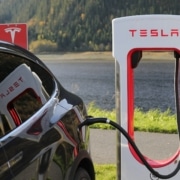The 10 Financial Actors Who Stand in the Way of Slowing Climate Change

Who are the key financial actors that can lead the low-carbon transition in the fossil fuel industry? Much like the fossil fuel firms they invest in, actors in capital markets can play a central role in enabling or hindering the transition, by either shifting capital away from carbon-intensive industries, or aligning corporate governance with climate targets. What’s more, these financial actors don’t make up a large, unwieldy group. You can count them on two hands.
That’s what we found in our recent study, published in Environmental Innovation and Societal Transitions, where we mapped ownership dynamics between the 200 largest fossil fuel firms (colloquially known as the Carbon Underground 200) and their shareholders. Using a novel scoring mechanism, which blends the financial actor’s influence with their emissions exposure, we find that just ten actors—a mix of investment advisors, governments, and sovereign wealth funds—own 49.5 percent of the emissions potential from these 200 firms.
As alarm bells ring, production, emissions, and global temperatures continue a steady path toward climate catastrophe.
These ten actors, which include the likes of Blackrock and the Kingdom of Saudi Arabia, alone have the potential to shift the industry in a more sustainable direction. These actors may have inordinate influence in the industry due to the number of fossil fuel firms they invest in, the size of their holdings, or their exposure to potential emissions from the industry. Thus, engagement efforts by actors with less influence may fall short, without the support of these ten players. The results not only assert that financial markets can influence the trajectory of sustainability transitions but also exemplify that power is concentrated among just a handful of powerful and path-dependent financiers.
There is no question that we will fail to meet our global climate commitments if the fossil fuel industry does not dramatically reduce production. Achieving this, however, is a bit more complicated. Where credit is due, countries around the world have begun taking meaningful steps to taper the demand for fossil fuels through carbon pricing, energy retrofits, and electrification. But these actions alone have failed to constrict the relentless growth of the fossil fuel industry and its contributions to climate instability.
For meaningful climate action, demand-side climate solutions must also be complemented with supply-side interventions that limit the exploration, extraction, and transportation of fossil fuels, analogous to cutting with both arms of the scissors. There is a case to be made for such supply-side interventions—if the existing reserves of the 200 largest oil, gas, and coal are burned, it alone would surpass our global carbon budget three times over. It’s no wonder that climate scientists and policymakers alike have been calling for a rapid decline in greenhouse gas emissions for the better half of a century. Yet, as alarm bells ring, production, emissions, and global temperatures continue a steady path toward climate catastrophe.
Attempting to curtail fossil fuel production through supply-side interventions will likely face formidable political constraints. With immense political power and institutional inertia, the fossil fuel industry is unlikely to restrict emissions alone and, perhaps more insidiously, will lobby to subdue effective climate policies that threaten business as usual. In Canada for example, the federal government maintains a “one eye shut” approach to climate policy, actively propping the industry with public financial support and weakened production targets.
Subscribe to the Ethical Systems newsletter
But this is where capital markets can come in; certainly, a climate-safe future is in their best interest. Inaction on climate change poses substantial climate-related financial risks, which could manifest across multiple carbon-intensive sectors with significant consequences for economic and financial stability. Within this context, there is a case for radical intervention by capital markets to mitigate the financial and reputational risks associated with climate change.
Capital markets have historically been foundational in supporting sociotechnical transitions (like the industrial revolution, steam, and telecommunications) and will be vital once again in a low-carbon transition. The uptake of fossil fuel divestment, net-zero targets, and voluntary commitments—like the Glasgow Finance Alliance for Net Zero—highlight the channels through which investors could positively influence corporate governance in the fossil fuel industry. New guidelines require signatories of the alliance to stop funding new fossil fuel developments, implement just transition plans, and align lobbying and engagement efforts with net-zero targets. These interventions could have a considerable impact on curtailing fossil fuel production.
The call for action is ambitious but feasible with concerted effort. This will require all actors to align their actions with a carbon-constrained future. Financial actors will play a key role in the path we follow, as the low-carbon transition is not a technical question but a profoundly social and political one. So, financial actors that maintain holdings in fossil fuel firms and don’t wield their influence to enable the low-carbon transition should be held accountable for contributing to climate instability.
At the moment, many of these shareholders are falling short, continuing to finance the fossil fuel industry and vote against climate-related shareholder regulations. Last year, for example, Blackrock voted in favor of just 24 percent of social and environmental resolutions, down from 42 percent in 2020. These financial giants alone can rapidly shift the direction of climate change—yet choose not to.
Citizens and beneficiaries ultimately have the power in defining what these financial actors do; by pressuring organizations like the Norges Bank, in Norway, and the government of India, to stop propping up the fossil fuel industry, we stand a much better chance at avoiding the most catastrophic climate change scenarios.
Truzaar Dordi is a doctoral researcher at the University of Waterloo, in Canada, working in the fields of climate finance, energy policy, and sustainability transitions.









